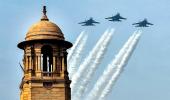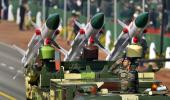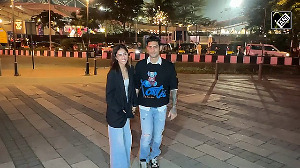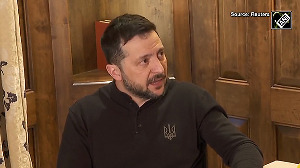Each Bhabha Kavach has four hard armour plates, which protect the wearer from the front, back, and either side.
It can protect CAPF personnel from 7.62 mm bullets fired from AK-47 rifles -- the chosen weapon of terrorists from Kashmir to Bastar.
Ajai Shukla reports.

When the Central Armed Police Forces (CAPFs) under the ministry of home affairs demanded bulletproof jackets that offer greater protection than those used by the Army, the Ordnance Factory Board (OFB) turned to the agency that makes the country's nuclear warheads -- Bhabha Atomic Research Centre.
The OFB also brought in defence public sector undertaking Mishra Dhatu Nigam (MIDHANI). The bulletproof jacket they developed together, named Bhabha Kavach in recognition of BARC's contribution, has recently cleared firing trials at the Gujarat Forensic Science University.
The challenge was to develop a jacket that weighed less than 9.5 kg and could stop steel-jacketed, 7.62-mm NATO-standard bullets.
This was intended to protect CAPF personnel from 7.62 mm bullets fired from AK-47 rifles -- the chosen weapon of terrorists from Kashmir to Bastar.
OFB officials say the trials have validated that the Bhabha Kavach meets US National Institute of Justice (NIJ) Level III standards, which guarantees protection against 7.62 mm NATO-standard bullets.
Most army bulletproof jackets meet the lesser NIJ Level II standard, which protects soldiers from 9 mm bullets fired from a carbine or handgun. That is because the army places a premium on mobility as well as protection and does not want a heavy jacket.
CAPFs like the Central Reserve Police Force, Border Security Force, Indo-Tibet Border Police, and Sashastra Seema Bal, which secure the towns and cities of Kashmir, are more exposed to AK-47 bullets.
In 2016-2017, in consultation with the CAPFs, the Bureau of Police Research and Development laid down specifications for a heavier jacket with NIJ Level III protection, said V K Chaudhary, additional general manager, OFB.
The OFB states the weight specifications have been more than met.
"The Bhabha Kavach weighs 9.2 kg, 300 gm lighter than the requirements," said Chaudhary.
OFB officials say the Bhabha Kavach is built from layers of 'high-density, high-tenacity polyethelene, which are thermo-sealed' by MIDHANI.
This means the layers are fused together at high temperature.
This forms a thick, hard armour plate, which is then sprayed with BARC's carbon nanomaterial.
Soaking into the layers of the plate, the nanomaterial instils the toughness and tenacity needed to slow down and trap a bullet as it passes through the plate.
Bulletproof jacket armour is of two types.
Soft armour provides lesser protection, suitable for threats from handgun and small arms bullets and is worn by bodyguards and VIPs against personal threats.
Hard armour is stronger and heavier and is designed to stop high calibre rounds. NIJ Level IV jackets even provide protection against armour-piercing rounds.
Each Bhabha Kavach has four hard armour plates, which protect the wearer from the front, back, and either side. BARC has transferred the carbon nanomaterial technology to the OFB.
Chaudhary says the CAPFs have projected a combined initial requirement of 100,000 jackets.
Once it receives a supply order, OFB says it will deliver 10,000 jackets per month. This can be ramped up, based on order volumes.
The OFB is also exploring export markets for the Bhabha Kavach, including Nepal, Vietnam, Indonesia, and Malaysia, say officials.












 © 2025
© 2025